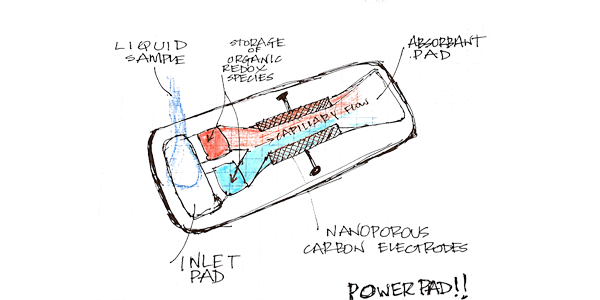Graphic: Illustration of powerPAD clean water monitoring device
Juan Pablo Esquivel, a senior fellow in Professor Paul Yager’s research group, led a team that received a $50,000 seed grant from the Bill & Melinda Gates Foundation at the 2014 Electrochemical Energy and Water Summit of the Electrochemical Society (ECS). The meeting, held in October in Cancun, Mexico, and which ECS called its first “Science for Solving Society’s Problems Challenge,” addressed critical technology gaps in water, sanitation and hygiene challenges around the world.
ECS partnered with the Bill & Melinda Gates Foundation to leverage the talents of scientists and engineers in the areas of electrochemistry and solid state science and technology. The conference presented an on-the-spot challenge: teams that developed the best solutions for improving access to clean water and sanitation in developing countries would win money to develop their ideas. The researchers had just three days to form teams and develop their proposals. In all, the conference awarded $210,000 of seed funding to the top four teams.
This conference was Esquivel’s first experience attending an ECS meeting. He teamed with a former colleague of his from the Instituto de Microelectronica de Barcelona in Spain and a new collaborator from Simon Fraser University in Vancouver, B.C. The team developed and presented a proposal for powerPAD, a biodegradable, inexpensive power source for monitoring water quality.
The team proposed that powerPAD could use paper fuel cell technology to analyze water samples and generate power from its sample source through electrochemical reactions. This all-in-one approach to water quality monitoring may be an attractive option for use in the developing world or other low-resource settings. The device eliminates the need for resources that might not be readily available in developing countries, such as expensive, complicated instruments and access to power sources like batteries or electricity from a power grid.
On the first day, conference organizers held a brainstorming session to review the priority areas projects would address. Over 40 proposals were submitted the second day, and on the third day 30 teams were selected to give “elevator-pitch” style presentations to a panel of judges, who evaluated the proposals for innovation, collaboration, mission and capacity.
As one of the finalist teams, Esquivel and his teammates had just five minutes to present their pitch to the panel of judges, which included prestigious faculty and researchers from around the world. Esquivel likened the experience to the reality business plan competition TV show “Shark Tank.” In their allotted five minutes, the team gave a brief PowerPoint presentation, describing the problem and their proposed solution. The team then gave a live demonstration, and at this point, Esquivel got creative.
Esquivel came to the “Shark Tank” armed with several common objects he gathered from around the conference hotel. Recounting his demonstration, he explains, “I took a piece of coffee filter, which I collected from the hotel cafeteria. I drew the carbon ‘electrodes’ with a pencil and the ‘reactants’ with some crayons from the children’s playground and showed the capillary action by sinking the device in one of the judges’ coffee mug.”
The judges then had five minutes to ask the team questions. “There were a lot of really tough questions,” Esquivel recalls. “But we were very happy with the outcome.” The team left the conference eager to launch their project. They have one year to establish a proof of concept, but after their intense experience developing and pitching their proposal at the conference, Esquivel is confident the team is well prepared to make fast progress.
Esquivel came to UW Bioengineering in 2013 via the Marie Curie Fellowships program. Marie Curie Fellowships, awarded by the European Commission, support training and mobility of scientific researchers throughout Europe and advance the EU’s impact upon science, engineering and technology. Previously a senior fellow at the Instituto de Microelectronica de Barcelona, an institute of the Spanish National Research Council, Esquivel will return to Spain in 2015 to contribute his expertise to the European scientific community. His current research in the Yager group focuses on integrating micro-fuel cell technology and alternative power sources with instrument-free point-of-care devices.
Esquivel is a 2010 Ph.D. graduate of the Universitat Autònoma de Barcelona. Originally from Mexico, he is a 2012 recipient of the TR35 award from the Spanish edition of the MIT Technology Review, which recognizes 10 top innovators in Mexico under the age of 35 of all areas of technology, including biotechnology, energy and nanotechnology.



